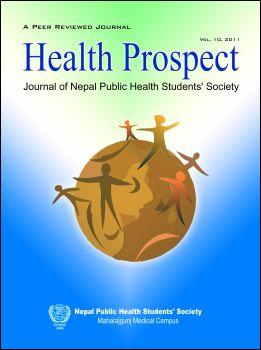Newborn Care Practices of Mothers in a Rural Community in Baitadi, Nepal
DOI:
https://doi.org/10.3126/hprospect.v10i0.5637Keywords:
Newborn, Essential New Born Care, Institutional delivery, Birth preparedness package, ANCAbstract
Background: Despite efforts by government and other agencies, neonatal morbidity and mortality are still high in Nepal. Among all other reasons, newborn care practices are one of the major contributors for such high rates of morbidity and mortality.
Objective: To find out the essential newborn care practices in a rural community.
Design: Community based descriptive (cross sectional) and explorative study.
Setting: Siddheshwar, Siddhapur and Gujar VDCs of Baitadi district.
Participants: 71 mothers having less than 3 month infants.
Materials and Methods: Semi-structured pre-tested tools were used to interview mothers along with check list for case studies.
Statistical analysis: Data was analyzed using SPSS 11.5 for widows.
Results and Conclusion: More than two third mothers (71.8%) took ANC service and average number of ANC service was 3.16 times. Most of the deliveries (91.5%) took place at home (69.0% in living room and 22.5% in cattle shed) which were mostly conducted by relatives (29.6%) or family members (35.2%) or self (8.5%). Nearly two third of the respondents (64.8%) did not use clean home delivery kit (CHDK) and more than one fourth (26.8%) used "used blade" for cord cutting. About 86.0% of the respondents did not use any substance on the stump, and one third (33.8%) did not wipe their babies. Most of the respondents (84.4%) burnt firewood for heating the room. More than two third (38%) of the respondents bathed their babies within one hour and only 18.3% of respondents bathed their babies after 24 hours. Only 7.0% of the respondents’ breast fed their babies within one hour, though all babies were breast fed. Nearly one third (29.6%) of the respondents discarded the first milk (colostrum). Most of the respondents (87.3%) did not give pre lacteals to their newborns and more than two third (70.4%) did not seek any health services for their newborns. More than one third (35.2%) did not vaccinate their babies. Regarding the birth preparedness practices more than half did not practice for each of pregnancy, delivery and newborn care. The common reasons behind harmful practices were lack of awareness, traditional cultural practices and lack of free time for the mothers. Therefore, there is an urgent need to introduce interventions to address newborn care practices focusing on marginalized and disadvantaged communities in the area.
DOI: http://dx.doi.org/10.3126/hprospect.v10i0.5637
Health Prospect Vol.10 2011, pp.5-9




